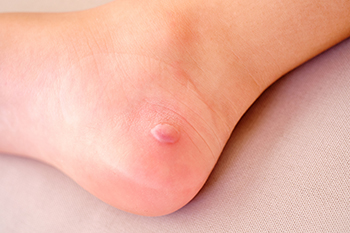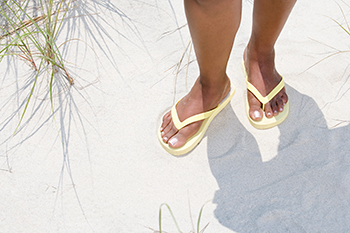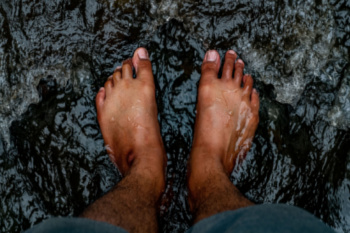Connect With Us
Blog

Diabetic blisters are a rare but serious skin complication that can occur in people with diabetes. These blisters often appear suddenly, usually on the feet or toes, and may resemble burn blisters. They are typically painless, filled with clear fluid, and may be surrounded by slightly red or swollen skin. Poor circulation, nerve damage, and uncontrolled blood sugar levels are common causes. While they may heal on their own, diabetic blisters are a warning sign of underlying issues and can lead to infections, if not cared for properly. A podiatrist can diagnose diabetic blisters through a physical exam and an evaluation of medical history. Treatment focuses on protecting the area, preventing infection, and management of blood sugar levels. In some cases, topical medications or dressings may be applied. If you notice unexplained blisters on your feet, especially without injury, it is suggested that you schedule an appointment with a podiatrist for proper care and monitoring.
Blisters are prone to making everyday activities extremely uncomfortable. If your feet are hurting, contact one of our podiatrists of Granite State Podiatry Associates. Our doctors can provide the care you need to keep you pain-free and on your feet.
Foot Blisters
Foot blisters develop as a result of constantly wearing tight or ill-fitting footwear. This happens due to the constant rubbing from the shoe, which can often lead to pain.
What Are Foot Blisters?
A foot blister is a small fluid-filled pocket that forms on the upper-most layer of the skin. Blisters are filled with clear fluid and can lead to blood drainage or pus if the area becomes infected.
How Do Blisters Form?
Blisters on the feet are often the result of constant friction of skin and material, usually by shoe rubbing. Walking in sandals, boots, or shoes that don’t fit properly for long periods of time can result in a blister. Having consistent foot moisture and humidity can easily lead to blister formation.
Prevention & Treatment
It is important to properly care for the affected area in order to prevent infection and ease the pain. Do not lance the blister and use a Band-Aid to provide pain relief. Also, be sure to keep your feet dry and wear proper fitting shoes. If you see blood or pus in a blister, seek assistance from a podiatrist.
If you have any questions, please feel free to contact our offices located in Manchester and Bedford, NH . We offer the newest diagnostic and treatment technologies for all your foot care needs.

Flip-flops may feel convenient in warm weather, but they can have negative effects on foot health. Wearing them regularly alters the natural gait pattern and affects the biomechanics of the foot and ankle. This often leads to shorter strides and overworked muscles, which can contribute to pain and instability. Prolonged use may increase the risk of foot conditions such as plantar fasciitis, tendonitis, or stress injuries due to lack of support. A podiatrist can evaluate any issues caused by improper footwear and recommend healthier alternatives that provide stability and comfort. If you are experiencing foot discomfort from wearing flip-flops, it is suggested that you consult a podiatrist who can treat various conditions, and guide you on alternative shoe choices to consider.
Flip-flops can cause a lot of problems for your feet. If you have any concerns about your feet or ankles, contact one of our podiatrists from Granite State Podiatry Associates. Our doctors will assist you with all of your foot and ankle needs.
Flip-Flops and Feet
Flip-flops have managed to become a summer essential for a lot of people. While the shoes may be stylish and easy to slip on and off, they can be dangerous to those who wear them too often. These shoes might protect you from fungal infections such as athlete’s foot, but they can also give you foot pain and sprained ankles if you trip while wearing them.
When Are They Okay to Wear?
Flip-flops should only be worn for very short periods of time. They can help protect your feet in places that are crawling with fungi, such as gym locker rooms. Athlete’s foot and plantar warts are two common fungi that flip-flops may help protect your feet against.
Why Are They Bad for My Feet?
These shoes do not offer any arch support, so they are not ideal for everyday use. They also do not provide shock absorption or heel cushioning which can be problematic for your feet. Additionally, you may suffer from glass cuts, puncture wounds, and stubbed toes since they offer little protection for your feet.
More Reasons Why They Are Bad for Your Feet
- They Slow You Down
- May Cause Blisters and Calluses
- Expose Your Feet to Bacteria
If you have any questions, please feel free to contact our offices located in Manchester and Bedford, NH . We offer the newest diagnostic and treatment technologies for all your foot care needs.

Hammer, claw, and mallet toes are toe deformities that affect the joints and can cause pain, discomfort, and difficulty in walking. A hammertoe bends at the middle joint, a mallet toe affects the joint closest to the tip, and a claw toe involves abnormal bending at both the middle and end joints, often pointing downward. These conditions may be caused by wearing tight or ill-fitting shoes, muscle imbalances, arthritis, trauma, or a genetic predisposition. Symptoms include curled or bent toes, pain while wearing shoes, corns or calluses on the tops or tips of toes, in addition to redness, swelling, and restricted movement. The affected toes may appear misshapen and feel stiff or sore, especially during activity. A podiatrist can diagnose the condition with a physical exam and possibly X-rays to assess joint damage or misalignment. Treatment may involve changing footwear, using custom orthotics, toe exercises, or, in more severe cases, surgery to realign the joints. If you have any of the above ailments, it is suggested that you schedule an appointment with a podiatrist who can accurately diagnose and treat these conditions.
Hammertoes can be a painful condition to live with. For more information, contact one of our podiatrists of Granite State Podiatry Associates. Our doctors will answer any of your foot- and ankle-related questions.
Hammertoe
Hammertoe is a foot deformity that occurs due to an imbalance in the muscles, tendons, or ligaments that normally hold the toe straight. It can be caused by the type of shoes you wear, your foot structure, trauma, and certain disease processes.
Symptoms
- Painful and/or difficult toe movement
- Swelling
- Joint stiffness
- Calluses/Corns
- Physical deformity
Risk Factors
- Age – The risk of hammertoe increases with age
- Sex – Women are more likely to have hammertoe compared to men
- Toe Length – You are more likely to develop hammertoe if your second toe is longer than your big toe
- Certain Diseases – Arthritis and diabetes may make you more likely to develop hammertoe
Treatment
If you have hammertoe, you should change into a more comfortable shoe that provides enough room for your toes. Exercises such as picking up marbles may strengthen and stretch your toe muscles. Nevertheless, it is important to seek assistance from a podiatrist in order to determine the severity of your hammertoe and see which treatment option will work best for you.
If you have any questions, please feel free to contact our offices located in Manchester and Bedford, NH . We offer the newest diagnostic and treatment technologies for all your foot care needs.

